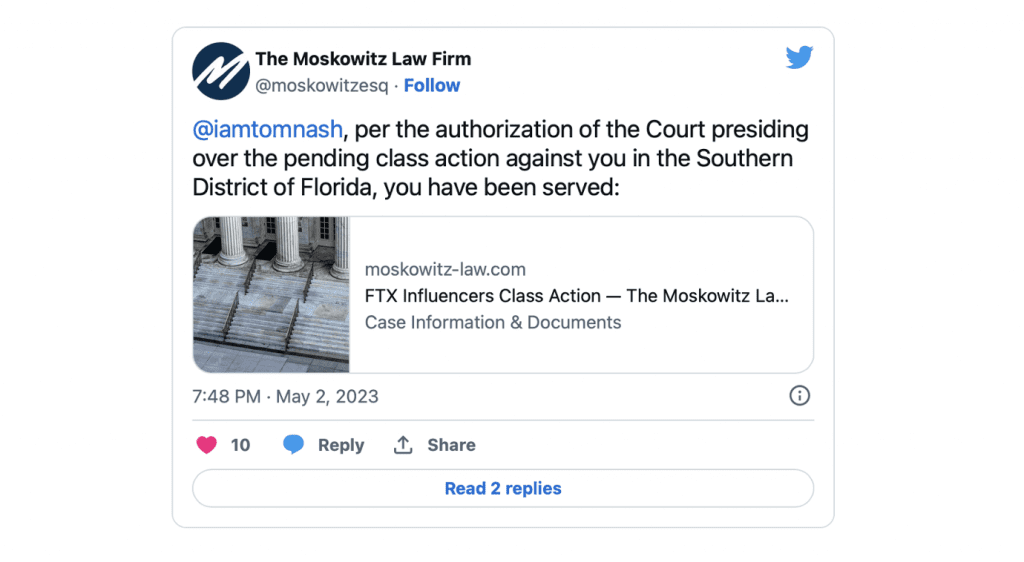Edwin Garrison got the greenlight from a federal court in Florida this week to serve Tom Nash – one of the defendants in the FTX-centric lawsuit that he filed in the wake of the crypto exchange’s collapse late last year – via Twitter and served the YouTuber on the Elon Musk-owned platform on Tuesday. In an order on Monday, Judge Cecilia Altonaga of the U.S. District Court for the Southern District of Florida granted Garrison’s motion to serve Nash with process through alternate means, finding that “e-mail, social media, and posting on a designated website are “reasonably calculated to give notice to Nash,” who is being sued, along with a number of other influencers that allegedly promoted FTX in exchange for “undisclosed payments ranging from tens of thousands of dollars to multi-million dollar bribes.”
In her order, Judge Altonaga stated that the plaintiffs in Garrison’s lawsuit had served all of the defendants (namely, Kevin Paffrath, Graham Stephan, Andrei Jikh, Jaspreet Singh, Brian Jung, Jeremy Lefebvre, Ben Armstrong, Erika Kullberg, and Creators Agency, LLC) except for Nash, “a YouTube star with over 283,000 subscribers to his YouTube page, who was paid [$50,000 per month] to endorse FTX” without alerting his viewers about such compensation. The plaintiffs’ counsel asserted that they were unable to discern Nash’s address in the country of Georgia, where he is currently believed to be residing, and in light of his failure to respond to the email that they sent to his personal address in March, they needed an alternative method to serve Nash with the complaint.
Citing an earlier decision from the U.S. District Court for the Southern District of Florida, Judge Altonaga asserted that “district courts have broad discretion under FRCP Rule 4(f)(3) to authorize other methods of service that are consistent with due process and are not prohibited by international agreements.” The judge noted that while the U.S. and Georgia are both parties to the Hague Convention, “the Convention does not specifically prohibit service through … e-mail, through social media, or through publication on a designated website,” the latter of which includes the complaint and other relevant filings. Accordingly, service by e-mail or Internet communication in this case would not violate an international agreement, the judge found.
“Plaintiffs cite ample cases where courts have granted leave for a plaintiff to serve by e-mail, and where courts have granted leave for a plaintiff to serve by website posting,” per Judge Altonaga, who stated that “in those cases, as here: (1) the defendants conducted their businesses over the Internet; (2) the defendants used e-mail regularly in their businesses; and (3) the plaintiffs showed that e-mail was likely to reach the defendants.” Here, the plaintiffs’ counsel argued that Nash has “an established Internet-based business; utilizes electronic means, including Twitter, as reliable forms of contact; and has publicly acknowledged his personal e-mail address … which is valid and operational.”
Judge Altonaga confirmed that “courts have also authorized service through social media under similar circumstances.”
Against that background, the court held that the plaintiffs had “shown good cause why leave should be granted to allow service of summons, the complaint, and all filings and discovery in this matter on Nash via e-mail, social media” – by posting the URL to the service website on The Moskowitz Law Firm Twitter account and tagging @iamtomnash – “or posting on [the] designated service website.”
Counsel for the plaintiffs served Nash via Twitter on May 2 …

Garrison and co. filed suit against the crypto/finance-focused influencers in March, arguing that the now-bankrupt FTX “could not have arisen to such great heights without the massive impact of these influencers.” Garrison is also the lead plaintiff in a separate, but similar FTX lawsuit that is being waged against FTX founder and former CEO Sam Bankman-Fried, along with big-name celebrities like Tom Brady, Gisele, Shaq, Larry David, etc. for allegedly “promoting, assisting in,” or “actively participating in” the offer and sale of FTX “unregistered securities.” In both cases, the defendants are being accused of violating the Florida Securities and Investor Protection Act, which makes it unlawful to sell or offer to sell unregistered securities, and the Florida Deceptive and Unfair Trade Practices Act, as well as for engaging in civil conspiracy.
THE BIGGER PICTURE: The court’s decision to allow the plaintiffs to serve Nash via tweet comes amid a number of recent decisions that have permitted service of documents via social media and blockchain tech, thereby, “illustrating how the courts are fashioning solutions to address the unique and logistical challenges of identifying and serving anonymous crypto wallet holders and U.S. nationals living abroad,” Akerman LLP’s Joanne Gelfand, R. Adam Swick, and John Thompson stated in a recent note.
Citing a case of first impression, Gelfand, Swick, and Thompson state that when the appointed liquidators were unable to locate Three Arrows Capital’s founders, Su Zhu and Kyle Livingstone Davies, they sought approval from the bankruptcy court to serve discovery subpoenas on the now-defunct crypto hedge fund’s founders via social media and email. In December, the Bankruptcy Court for the Southern District of New York ultimately granted the service motion, in part, and denied it, in part. Primarily, the court denied the motion with regard to Zhu, a Singapore resident, as Rule 45(b)(3) does not expressly authorize serving a non-U.S. national or resident with a subpoena in a foreign country – no matter the medium of the service.
Turning to Livingston Davies, a U.S. national believed to be in Singapore, the court granted the motion (due to his status as a U.S. national), and agreed to service via Twitter, in particular, on the basis that it was “reasonably calculated” to provide notice and due process because of his recent use of the social media platform.
“Acknowledging that the lack of case law for service under FRCP Rule 45 via social media and email ‘is curious,’” Gelfand, Swick, and Thompson assert that the court relied on Rule 4 cases that permitted the alternative means of service and “appeared to limit the ruling to the particular facts of the case, recognizing that the result was correct in the ‘factually rare circumstance’ presented.”
Before that, the Supreme Court of the State of New York approved a bid by crypto exchange LCX AG to serve the individual(s) controlling an Ethereum wallet alleged to be holding stolen crypto funds with various legal documents via “airdrop” of a non-fungible “service” token. In June 2022, a New York Supreme Court judge held that LCX AG could serve the “John Does” defendants with a service token that “contained a hyperlink to a website created by [the plaintiff’s attorneys at Holland & Knight], wherein the plaintiff’s attorneys shall publish [the] Order to Show Cause and all papers upon which it is based.” Beyond that, the court stated that the service hyperlink could “include a mechanism to track when a person clicks on the [link],” noting that “such service shall constitute good and sufficient service for the purposes of jurisdiction under New York law on the person or persons controlling the [wallet] address.”
The case is Edwin Garrison, et al., v. Kevin Paffrath, et al., 1:23-cv-21023 (S.D. Fla.)











